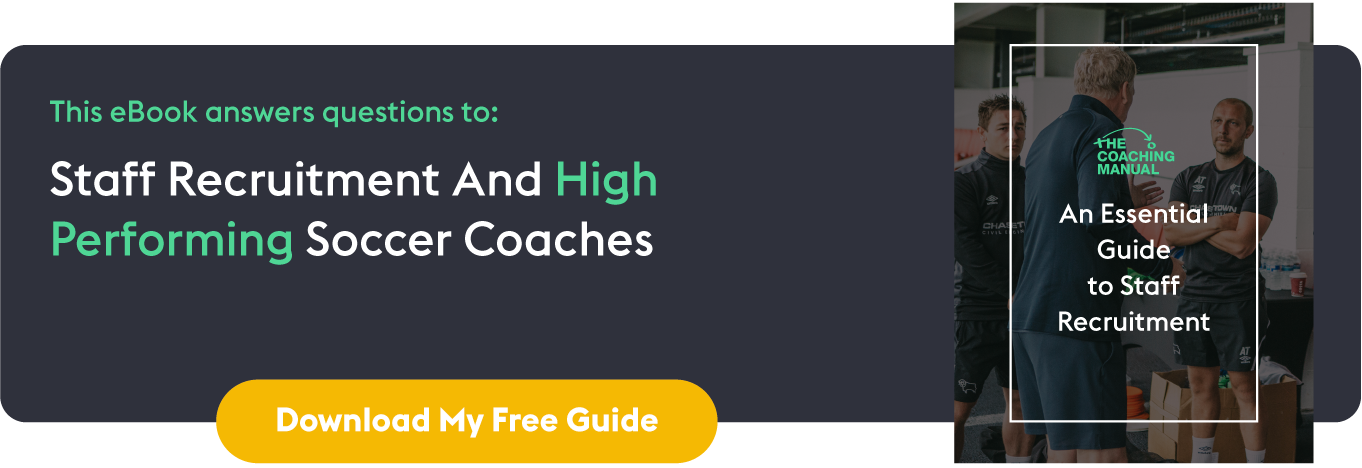The promotion from senior coach to Director of Coaching (DOC) is a huge jump and many who make it do so without having a full understanding of what it takes to succeed in their new position. They possess all the required skills of a high-quality coach - excellent man-management ability, superb attention to detail, innovative tactical thinking - but lack the administrative skills required to lead a team of coaches.
The best DOCs are able to take a long-term view of where they want to take their club or organisation, considering everything from club culture and sporting philosophy to budget management and staff development. Here are the key attributes required to become a successful DOC.
Leadership
At a large club or academy, the DOC will be responsible for managing hundreds - or even thousands - of coaches. Naturally, this requires a strong leader with the ability to inspire and motivate their team. They should set an example to their coaches in terms of work ethic and sporting philosophy and should be the embodiment of the club's cultural values.
Eye for detail
As well as looking at the bigger picture, you'll need to know where and when to take a more granular approach. A keen eye for detail helps a DOC to identify coaches with the specific skill sets required to move the club forward, even if those talents have been underused in the past. Once you've found coaches with the necessary skills, you'll want to ensure that they're being harnessed effectively by pairing them up with the age group or team that best suits their abilities.
Outstanding decision making
With overall responsibility for sporting matters, the DOC has to make important decisions every single day. Sometimes, this will require putting in the hours to carefully consider a challenge from all angles before opting on a course of action; in others, it will involve having to make a snap judgement based on your own experiences. Either way, you'll need to be prepared to make those decisions, to trust your instincts, and to understand when a planned course of action needs to be reassessed.
Technical expertise
Just because a DOC no longer has day-to-day contact with players, that doesn't mean they can afford to abandon the technical aspects of coaching. As a Director of Coaching, you should strive to remain at the forefront of the coaching industry; how else can you expect to challenge individual coaches on their strategic decisions, or establish whether your sporting philosophy is being brought to life on the training field?
Exemplary communication skills
The DOC needs to be a fantastic communicator to ensure that their sporting and cultural visions for the club are implemented, rather than remaining as nice ideas with little practical impact. They understand that different people learn in different ways. Some prefer to take in information visually, whereas others would rather acquire knowledge practically - learning on the job, as it's often termed. To be a successful DOC, you'll need to be able to get your message across clearly and efficiently to a wide range of stakeholders with different learning preferences.
Eagerness to learn
Your personal career development doesn't stop the moment you get promoted. The best DOCs continue to learn in the role by acquiring new qualifications, attending courses, sharing knowledge with their peers, and keeping an open mind about ideas presented by their own coaches.
Visionary
Much as a DOC needs to have confidence in their decision-making ability, they should possess a clear vision about what they want to achieve at the club. This should encompass everything from developing a playing philosophy and implementing a new tactical approach, to promoting a preferred coaching methodology and establishing a recruitment strategy. Your vision should be backed up by objectives and key performance indicators that allow you to chart progress toward fulfilling your vision.
Long-term focus
Sport is ultimately a results business, but as a DOC, it's important not to place too much emphasis on win-loss ratios at the expense of player development and working toward your long-term strategy. New methods and tactics can't simply be implemented overnight. Coaches need to understand that they won't have to justify their actions or fight for their job after a run of poor performances.
Managing staff development and growth
If you're working with ambitious coaches, it's only natural that they'll want to progress to more senior roles, take on more responsibility, and develop broader skill sets. As the DOC, it's up to you to help your staff by evaluating their strengths and weaknesses, and creating a roadmap for achieving their career objectives. You'll need to give them scope for formal development - such as allowing time off to attend seminars or acquire new coaching qualifications - and hold regular performance reviews to ensure that they're on track. Fail to pay enough attention to staff development and you'll risk losing your most talented coaches to rival clubs.
The ability to create a welcoming and productive club culture
A supportive, inclusive and productive culture helps you to attract and retain quality coaches and gives your players something to rally around. The job of formulating, introducing and maintaining a positive culture is down to the DOC. Without your direction, it can be all too easy for a negative - or even toxic - culture to develop, centred around a small group of coaches or players, and leaving others feeling alienated.
Responsibility for handling coaching budgets
Whether it's improving the locker rooms, upgrading the playing surface or hiring more coaches, every DOC has a shopping list for their club. Likewise, your coaching staff will have their own ideas about how money should be invested. Because you have the final say, you need a clear grasp of the club's finances, understanding how much money is available and when it can be spent. Most importantly, you'll need to assess where that spending should be focused in order to achieve the maximum possible impact and to justify your decisions to the board.



